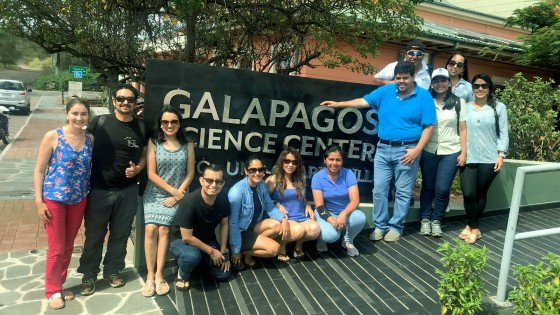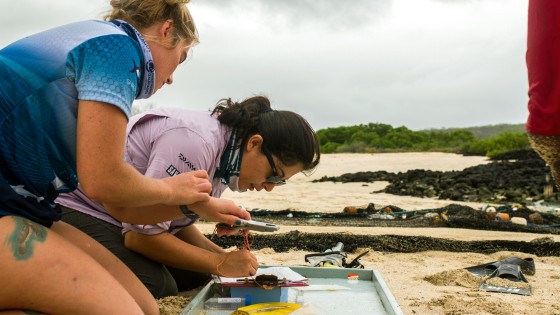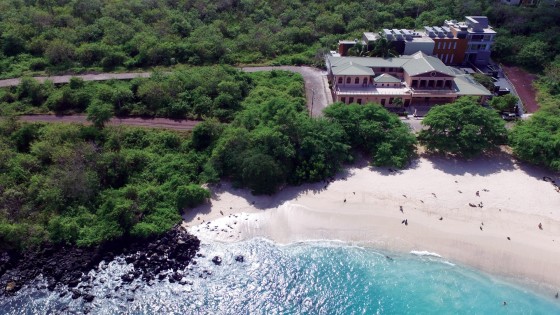Master's in Environmental Management
2 years (4 semesters)
Classes: 13
Total credits: 45
Friday from 5:00 p.m. to 9:00 p.m.,
Saturday from 8:00 a.m. to 2:00 p.m.,
and Sunday from 08:00 a.m. to 1:00 p.m.
Approved on November 14th, 2018
Resolution RPC-SO-42.No.713-2018
$14,999.60
Enrollment fee: $1,363.60
Tuition: $13,636
* Scholarship for permanent residents in the Galapagos Province
* Final cost, including scholarship for permanent residents in Galapagos: $13,000
January 22,
February 19,
March 19,
April 23, 2022
For scholarships, only those who have taken the application test until April 17 and the knowledge test until April 3 will be call.
This professional master's degree is born from a comprehensive approach to Environmental Management, based on four axes: Biophysical Environment, Human Environment, Environmental Management, and Institutional Environment. In this interdisciplinary and multidisciplinary scheme, the conservation needs of natural resources and the social demands of the populations that depend on these resources are linked throughout the program, allowing for the understanding, analysis, and solution of environmental problems from the social perspective. This orientation is combined with a solid background in the management of environmental and organizational planning tools, understanding of the policy, and current environmental legislation; as well as with communication and environmental negotiation tools, which tend to achieve participatory management of natural resources and the environment. All this, together with the academic experience and relations with the authorities and the community that the University of San Francisco de Quito has achieved in almost two decades of presence, experience, and work on the islands.
Applicant's Profile
This program is aimed at professionals who preferably have a Bachelor's or Graduate degree registered in SENESCYT in:
- Specific Field: Environment, Forestry, Veterinary, Law.
- Detailed Field: Biology, Agricultural and Livestock Production, Technology and Environmental Protection, Economics, Political Science, Psychology, Geography and Territory, Administration, Tourism.
- Degree Course: Sociology, Anthropology, Education.
|
|
Professional Field
The training of human talent with adequate knowledge, competences, and skills for the better management of socioecological systems, environmental planning, formulation of projects aimed at Environmental Management, and promoting the participation of civil society in the resolution of environmental conflicts, is a priority in the Galapagos province. A deep knowledge of the Galapagueña reality is essential in order to achieve a comprehensive understanding of the system.
The training offered by the Master's in Environmental Management, Major in Socioecological Systems Management seeks to address the separation between technical knowledge and understanding of the social scenario. It is directed, to a large extent, at professionals who already occupy positions at different levels of management in the zonal coordination and provincial directorates of the different state portfolios that operate in the province, public entities at the regional level, the environment, and planning secretariats of the Decentralized Autonomous Governments, non-governmental organizations in the fields of conservation and development, as well as private initiatives dedicated to the sustainable management of the environment.
At the national and local levels, the fields of action for the Environmental Management training program are numerous and diverse, both publicly and privately. Within the public sector, insertion would take place at different levels of management within the central state portfolios associated with planning and socio-environmental management; while in decentralized instances it would occur mainly in the planning and environment departments or secretariats. In the private sector, professionals would be inserted in non-governmental organizations dedicated to the conservation and management of the environment at the national and regional levels. Additionally, private companies whose productive activities have harmful effects on the environment are included, as well as those dedicated to the production of goods and services based on the sustainable use of the environment.
It is important to highlight that, because it is a socially and environmentally complex system, the professional trained in the Galapagos scenario will acquire the knowledge, competences, and skills necessary for managing socio-ecosystems, both nationally and in other highly biodiverse countries with great challenges to face in terms of conservation and sustainable development.
Advantages
The Master's in Environmental Management, Major in Socioecological Systems Management seeks to contribute to the sustainable management of the environment in ecologically vulnerable and socially complex systems. To do this, the program trains professionals with high academic quality specialized in environmental management, capable of leading initiatives in environmental management and planning, conservation, sustainable use of natural resources, and participatory management of the environmental system, with an integrating vision that allows them to ensure the balance between the health of the environment and the satisfaction of social demands. The program also seeks to provide the necessary theoretical and methodological bases for:
- Identifying and interpreting the biophysical environment of the environmental system, and the social dynamics that are generated around the use of natural resources.
- Proposing and applying strategies for the conservation and management of natural resources and the environment, under the principles of participatory management.
- Applying the principles that govern the management of the institutional environment (the administration of organizations and projects, regional planning, and the relevant legal framework) to the solution of socio-environmental problems.
- In-person classes program on the San Cristóbal Island campus.
- Program hours compatible with other business hours.
- Classrooms and laboratories equipped for academic and research activities.
- Field activities to apply knowledge.
- Scholarships available for Galapagos residents.
- Payment plan.
Admission Process
Basic requirements:
-
Bachelor's degree registered at SENESCYT preferably in one of the following:
Specific Field: Environment, Forestry, Veterinary, Law.
Detailed Field: Biology, Agricultural and Livestock Production, Technology and Environmental Protection, Economy, Political Science, Psychology, Geography and Territory, Administration, Tourism. Degree Course: Sociology, Anthropology, Education.
For Bachelor's degrees obtained abroad, they must be apostilled or legalized by Consular means. The University will verify that the degree corresponds to the third level degree, in accordance with the current Academic Systmens Regulations. - Demonstrate proficiency in the English language equivalent to A1 of the Common European Framework.
- Copy of the identity card or passport.
- Degree certificate with grade average (can be submitted any time before the end of the first semester).
- Official transcript with grades (can be submitted any time before the end of the first semester).
- A printed copy of the professional degree from SENESCYT.
- Pass the USFQ Graduate admission exam. To do this, refer to the USFQ Postgraduate admissions process: http://www.usfq.edu.ec/admisiones/admisiones_posgrado
Specific program requirements:
- Submit three academic letters of recommendation (if you earned your last degree in the past two years), or professional letters of recommendation (if more than two years have passed since you obtained your last degree).
- Letter of intent for admission to the Program.
Funding and scholarships
Payment: Cash, Check, Credit card.
10% discount for USFQ Alumni.
Full payment
*Up to 12 months no interest with Banco del Pichincha, Banco de Guayaquil, Diners Club and Discover cards. Other cards taken as regular payments.
Semester or academic term payments:
*Up to 6 months no interest with Banco del Pichincha, Banco de Guayaquil, Diners Club and Discover cards.
*Conditions apply
Monthly payments
**Financing plan through checks that will be cashed monthly.
**Educational loan/financial institutions, or payment by check or guarantee voucher, while the bank makes the disbursement.
**To define your payment plan (Option 3 or 4), contact Robert Gonzáles at 2971700 ext. 1892. Office E 100.
Scholarships
In accordance with the Graduate Program Scholarship Regulations, all admitted applicants who are permanent residents of the Galapagos province will receive a scholarship of $2,000, which will be deducted from the total value of the program fees. In addition, 2 (two) partial scholarships of fifty percent will be awarded to applicants who demonstrate academic excellence and financial need during the admission process.
For more information on this, contact us at the phone numbers and email addresses that appear in the contact section.
Agreements
Cooperation Agreement with the Directorate of the Galapagos National Park, entity in charge of carrying out the Management Plan for the Protected Areas of Galapagos for Good Living.



